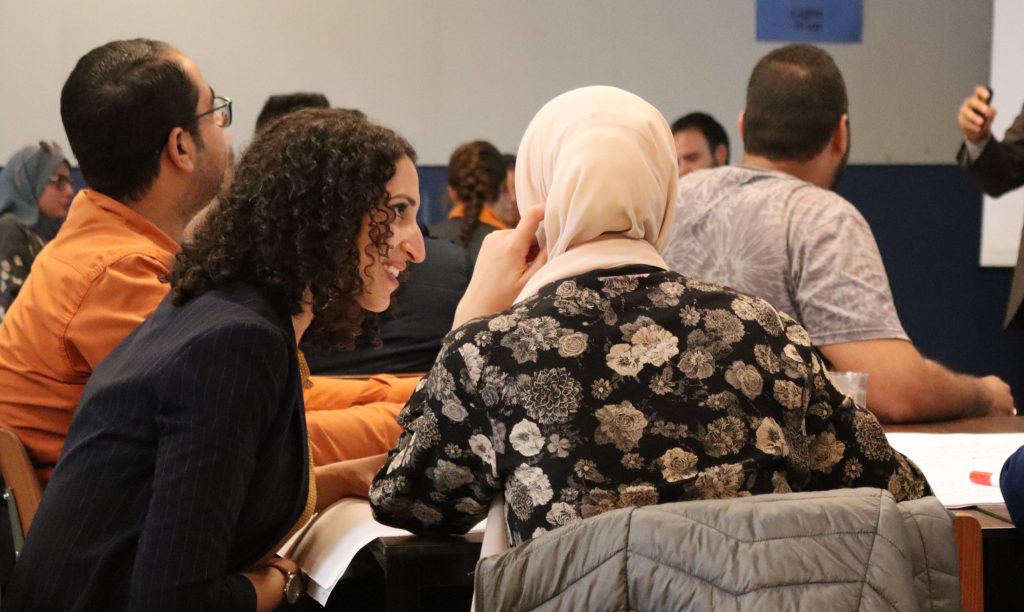The challenges posed by climate change and water governance are inextricably linked. Droughts threaten food security, floods disrupt communities, and poorly managed water systems amplify the impact of climate crises. Addressing these challenges requires a shared focus on local solutions that integrate climate adaptation and effective water governance.
The upcoming courses Local Climate Response and Multilevel Water Governance highlight the critical interplay between these fields, emphasising collaborative and localised approaches to create more resilient systems.

To explore the value and practical application of such collaborative and localised approaches, we spoke toZeina El Zein, Assistant Professor of Sustainable Architecture and Urban Design at the Helwan University, Cairo, who participated in the Shiraka Water Management Programme in 2023.

Participating in the course broadened my understanding of the complexities of water governance and its intersection with sustainable urban development. My biggest takeaway was the importance of adopting a multi-stakeholder approach to water management, where collaboration among policymakers, practitioners, and communities is essential to achieve sustainable and equitable solutions.
Zeina ElZein, Assistant Professor of Sustainable Architecture and Urban Design, Helwan University, Cairo, Egypt
The Interconnected Challenges of Climate and Water

Climate change intensifies water-related pressures, from rising sea levels to the depletion of freshwater resources. Local governments find themselves at the forefront of mitigating these impacts, tasked with ensuring food security, protecting ecosystems, and supporting economic stability. Effective water governance, rooted in multilevel collaboration, is essential for addressing such challenges holistically.
Water systems are particularly vulnerable to climate extremes, with droughts reducing availability and floods overwhelming infrastructure. In many regions, these crises expose gaps in governance, highlighting the need for clear roles, robust policies, and integrated solutions. Approaches that link water governance to climate resilience enable communities to adapt and thrive in the face of increasing uncertainties.
The Role of Professional Networks
Collaboration among professionals in water governance and climate adaptation is vital. By learning from one another, experts, local actors, and civil servants can share strategies, exchange innovations, and create a ripple effect of best practices in their local contexts.
The Shiraka Water Management Programme has “facilitated connections with a dynamic network of water professionals, fostering collaborations that have amplified the impact of my work,” reflects Zeina El Zein, Assistant Professor of Sustainable Architecture and Urban Design, Helwan University, Cairo, Egypt. Her role as a coordinator in the Water Youth Network (a network of organisations promoting collaboration on issues relating to water and youth engagement) allowed her “to engage with passionate young professionals worldwide, sharing best practices, and co-developing initiatives to address pressing water challenges”.
Professional networks allow practitioners to engage with peers facing similar challenges, offering not only technical solutions but also inspiration and support.
As UN-Habitat Youth Advisory Board member, Zeina ElZein also participated in the World Habitat Day 2024 panel discussion on youth Initiatives for Accessible Water and Sanitation in Urban Spaces. She emphasised the critical role of youth in shaping water-resilient urban environments, connecting global urban water management practices with local applications:

These professional relationships transcend borders, turning individual efforts into collective action. Global and regional networks not only amplify local initiatives but also create a sense of shared purpose among professionals addressing some of the world’s most pressing challenges.
Local Action, Global Learning
Solutions to climate and water challenges often lie at the intersection of local knowledge and global expertise. Programmes that foster these connections encourage participants to develop action plans tailored to their communities while drawing on international insights. 
“As an assistant professor of sustainable architecture and urban design, my back-home action plan focused on integrating water management into architecture and urban design education. Building on that, I developed and introduced the curriculum for an undergraduate course titled Urban Wastewater Management, which is now part of the Sustainable Architecture and Urban Design program at Helwan University.” – Zeina ElZein
Whether it’s implementing drought-resilient agriculture, redesigning urban water systems, or introducing educational initiatives to empower youth in water management, the integration of local action and shared knowledge is key. Programmes that bring professionals together help turn principles into practice and drive meaningful change at both local and global levels.
The Hague Academy’s courses on local climate response and multilevel water governance offer participants a unique opportunity to deepen their expertise and join a global network of change-makers. Through these platforms, professionals can address the most pressing challenges of our time.
For more information, see our upcoming courses:
